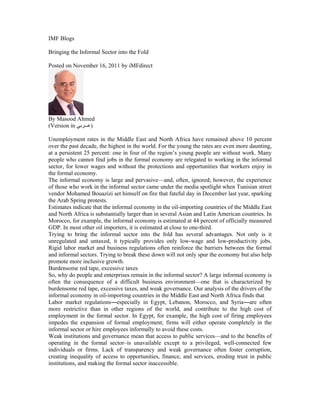
111611
- 1. IMF Blogs Bringing the Informal Sector into the Fold Posted on November 16, 2011 by iMFdirect By Masood Ahmed (Version in ربي ѧѧѧѧ (ع Unemployment rates in the Middle East and North Africa have remained above 10 percent over the past decade, the highest in the world. For the young the rates are even more daunting, at a persistent 25 percent: one in four of the region’s young people are without work. Many people who cannot find jobs in the formal economy are relegated to working in the informal sector, for lower wages and without the protections and opportunities that workers enjoy in the formal economy. The informal economy is large and pervasive—and, often, ignored; however, the experience of those who work in the informal sector came under the media spotlight when Tunisian street vendor Mohamed Bouazizi set himself on fire that fateful day in December last year, sparking the Arab Spring protests. Estimates indicate that the informal economy in the oil-importing countries of the Middle East and North Africa is substantially larger than in several Asian and Latin American countries. In Morocco, for example, the informal economy is estimated at 44 percent of officially measured GDP. In most other oil importers, it is estimated at close to one-third. Trying to bring the informal sector into the fold has several advantages. Not only is it unregulated and untaxed, it typically provides only low-wage and low-productivity jobs. Rigid labor market and business regulations often reinforce the barriers between the formal and informal sectors. Trying to break these down will not only spur the economy but also help promote more inclusive growth. Burdensome red tape, excessive taxes So, why do people and enterprises remain in the informal sector? A large informal economy is often the consequence of a difficult business environment—one that is characterized by burdensome red tape, excessive taxes, and weak governance. Our analysis of the drivers of the informal economy in oil-importing countries in the Middle East and North Africa finds that Labor market regulations―especially in Egypt, Lebanon, Morocco, and Syria―are often more restrictive than in other regions of the world, and contribute to the high cost of employment in the formal sector. In Egypt, for example, the high cost of firing employees impedes the expansion of formal employment; firms will either operate completely in the informal sector or hire employees informally to avoid these costs. Weak institutions and governance mean that access to public services—and to the benefits of operating in the formal sector–is unavailable except to a privileged, well-connected few individuals or firms. Lack of transparency and weak governance often foster corruption, creating inequality of access to opportunities, finance, and services, eroding trust in public institutions, and making the formal sector inaccessible.
- 2. Overly restrictive product market regulations and high tax burdens raise compliance and entry costs, so that firms have strong incentives to avoid them by operating informally. If it is too costly or if it takes too long for a firm to comply with regulations in the formal sector, this will drive firms toward the informal sector. It may be cheaper for an informal firm to pay a bribe for public services or to avoid the enforcement of regulations. Lost opportunities Some may ask what’s wrong with having a large informal sector? While the informal sector may provide some useful services, often both workers and the government lose out—workers because they operate in an unregulated environment, without protection, and the government because it loses an important source of tax revenue. In addition to not having access to social benefits, they also—over time—tend to see their skills dimish, because they don’t use their talents to the full and don’t get the chance to acquire new ones. They face little or no prospect of career advancement. Lack of access to well-paying and productive jobs—particularly for the growing number of young labor-force entrants—translates into lost opportunities and is a source of tension, for individuals and for society as a whole. What can policymakers do? To improve access to economic opportunities and achieve more inclusive growth, policymakers will need to reduce the costs and burdens of entering the formal economy. Changing labor regulations can make it less expensive for employers to hire workers formally. More straightforward rules for establishing and operating a business will encourage entrepreneurs to start businesses on a formal basis. Enforcing the rules fairly and consistently means that firms share not only the responsibilities but also the benefits of operating formally. Simpler tax regulations and stronger administration will complement these reforms. At the same time, workers in the informal sector will need help in acquiring the skills demanded by the formal sector. The Arab Spring has reminded us that growth is not enough in itself, particularly if its gains are captured by a privileged few and not spread broadly. Indeed, the presence of a large informal sector serves as a red flag that a country’s growth is not inclusive enough. Share this:
